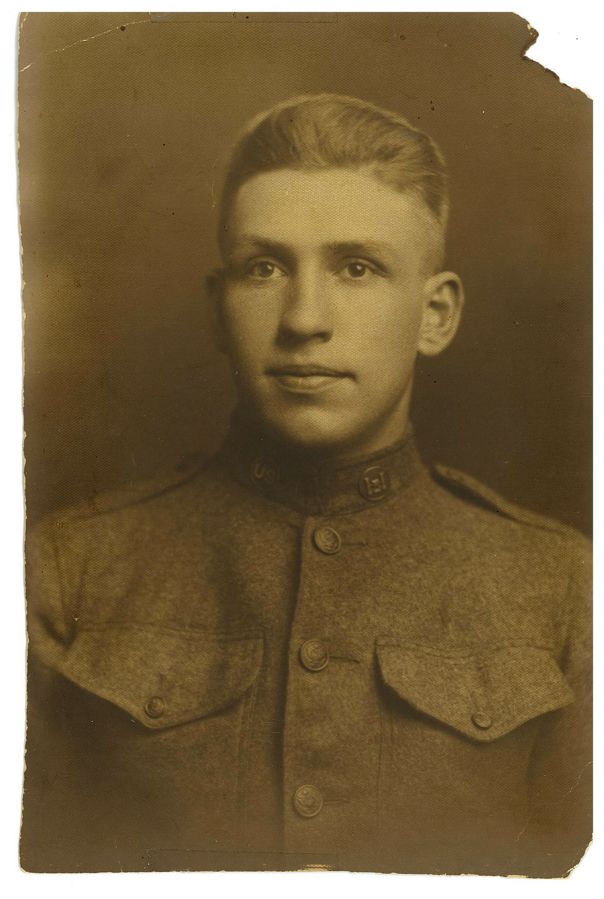A day before Thanksgiving in 1917, Vancouver-born John Blaker stowed two onions in anticipation of a “square meal” that included corned beef and hash, he hoped.
Nothing was certain in France, where Blaker was fighting in the Great War. He stooped over a piece of paper and penned a letter home to his parents in Vancouver the day before Thanksgiving that year, recalling the trip over.
Published in The Columbian in its entirety — apart from a few redacted words — the letter details Blaker’s journey to France on a ship.
“Some of the boys were real seasick,” wrote the 23-year-old, “as we had some rough weather.
“The wind blew 70 miles an hour for two days, so you can imagine how rough it was. I did not get sick, but really enjoyed the rough weather. One’s insides sure stand on end when the boat’s masts almost touch the water when she rolls over. One night the sailors left a hatch door open, and a big wave came rumbling down into the stairway, right into our sleeping quarters. I was in the bottom bunk and almost swamped. The water stood about four inches over my bed, so you can bet your boots, I was climbing about that time. It made it worse we had no lights. Lights were put out and smoking was not allowed after sunset.”
Blaker was among the 2 million Americans to arrive in France for the Great War, which had already consumed Europe for about three years. The first American troops had arrived about five months prior to Blaker’s letter, and they spread to the front to fight German troops without much training or the best gear, according to History.com.
“You don’t get any real news about the war,” he wrote. “Don’t worry about the outcome. Believe me the United States and the Canadian troops are ‘there.’ Things look a whole lot brighter than they did a year or two ago. Wish I could get to the front and fight with our troops.”
Blaker served in the Twentieth Engineers, the largest regiment in U.S. Army history, with over 8,200 officers and men. Their job as “Fighting Foresters” was to establish a logging network in Europe to supply troops with lumber for firewood, railroads, barracks, trench walls and more, according to the U.S. Forest Service.
Before Blaker enlisted for the war, he was a “millhand,” according to Katie Bush, public historian at the Clark County Historical Museum. (His family owned a lumber mill in the Proebstel area in Clark County, and it’s likely that Blaker worked there to gain skills that allowed his acceptance in the Twentieth Engineers.)
After the war
In 1919, Blaker boarded a ship in Bordeaux and sailed to New York to return home to Vancouver.
He worked for the Clark County Sheriff’s Office and Vancouver Police Department before becoming chief in 1937.
The biggest event to occur during Blaker’s tenure — meriting an Associated Press story that was published in the New York Times — was an Aug. 6, 1943, riot in downtown Vancouver that started from a brawl in a cafe.
“Chief of Police John Blaker blamed ‘hoodlums’ and ‘pay-day drunk’ today for inciting a riot last night which police finally dispersed with tear gas,” the article from the next day stated. “Three men were in the hospital and eight jailed.
“Chief Blaker said that the suspected ringleader of the rioters was in custody but no charges had been filed. Hundreds of persons drinking in waterfront beer taverns where the trouble started piled into the street. They were joined by soldiers and civilians. A crowd of about 1,000 persons quickly gathered. Taunts were flung at police and fighting broke out.
“Military police called to the scene had all soldiers back in their barracks within an hour. City police, aided by auxiliary civilian defense police, deputy sheriffs, State patrolmen and firemen who laid hoses as a threat, finally scattered the crowds.
“The demonstration broke out again later when about 600 persons gathered in front of the Vancouver police station. Vancouver police called authorities at near-by Kelso and Longview and asked that State Guard units be mobilized. Mayor John Hogg appealed to the crowd from the police station steps to disperse. He was jeered and a rock crashed through the glass pane in the station door.
“Police then charged, firing tear gas shells until the crowd dispersed. A tear gas shell struck Joe Walmer, amusement company employee, and he suffered a possible leg fracture. Patrolman Harold Edmonds suffered gas burns on one hand. The soldier, over whom the trouble started, was taken to Vancouver Barracks hospital with skull injuries suffered when struck by officer Pat Morrow.
“The soldier, police said, fought with a civilian in a cafe early in the evening. He was ejected, but returned later to assail the cafe ‘bouncer.’ Said Mayor Hogg today:
“‘I am going to appeal to the Governor to see that every beer tavern in Vancouver is closed nights hereafter.’”
Blaker retired in 1945 due to health issues and died in 1952. He was buried at the Old City Cemetery in Vancouver.




